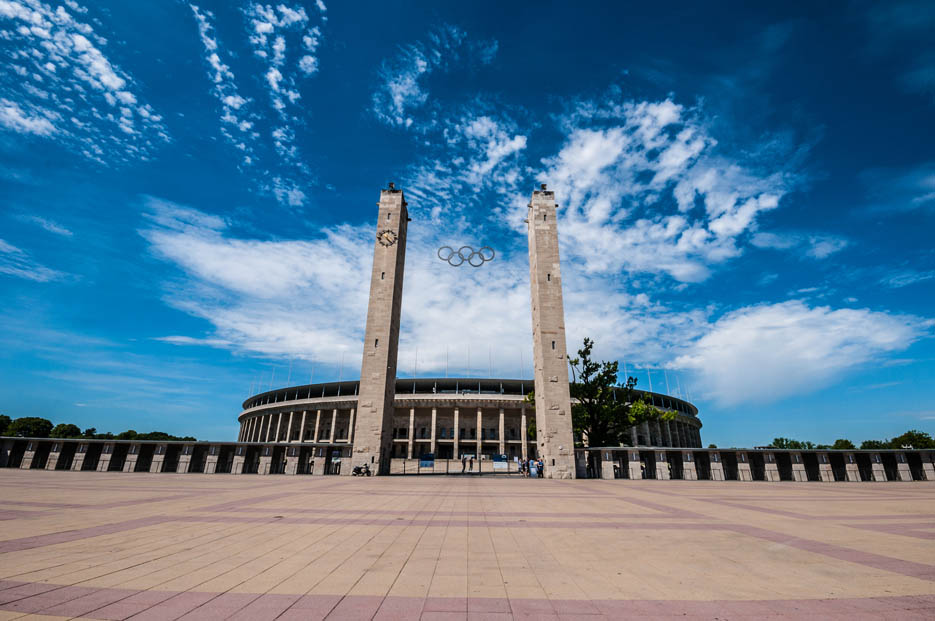Frankfurt Arena Complete Guide - Furnace Too Hot for the City
One of the Bundesliga’s most fiery stadiums will host the 2024 EURO matches - check out all you need to know in this Frankfurt Arena Complete Guide.


Few are as beautiful, none have a tarnished name like the Olympiastadion Berlin. Silly, at is just a stadium. Yet one that gets everyone's voice raised or keyboard buttons caps-locked when mentioned. Due to that inavoidable and all-known connection to the Nazi party and it's personification, so often compared to everything and everyone. So what actually does Adolf Hitler has to do with the Olympiastadion Berlin?
As we stated in the history section of the Olympistadion Berlin: The greatest stadium in the world with the worst reputation article, the ground was built during the rule of the German Nationalist Socialist Party. It ruled the country from 1933 to 1945 and one of the first major decisions was to build an Olympic sports park, made in the first year. As in 1931 Berlin was selected to host the following Olympic Games in 1936.
An event which links Olympiastadion Berlin and Hitler.
Yet Hitler's stamp is found on the beggings of the stadion as we know now it. He ordered the building of a major sports complex in Grunewald named Reichssportfeld - Empire's sports field. While the two brothers Werner and Walter March were the main architects, they were consulted by the chief Nazi architect Albert Speer. Yet they even had a more important supervisor, the German leader himself visited the site in October of 1934 to approve the design plans.
Hitler was involved in the project, as historians tell us, because he was left inspired during the German Gymnastics Festival in July 1933 in the then-newly built Neckar Stadium in Stuttgart. Although, the area immediately west of the Olympiastadion Berlin was even more of an interest to Hitler. Known as the Maifeld, it's a large stretch of flat grass with a stone structure known as the Bell Tower on the other end of it.
The Maifeld, or the May field, is known as such because it was created for the May Day celebrations on the first of the month. It's 250 metres long and 340 metres wide. For comparison, the longest line between the outer edges of the stadium itself, west to east is 310 metres long.
For Hitler, it gave a large area to have his massive crowds, parades, and speeches. It's often cited as the first major project the Nazis embarked on. For Hitler, it was a way of showing that under the party's leadership, Germany can achieve monumental milestones. Quickly.
It's usually avoided to say, but the numbers don't lie - the construction of the Olympiastadion Berlin was a major victory for the party. It lasted only 28 months.
For instance, the Santiago Bernabeu stadium, constructed a decade later, was built in over 37 months. Three year period remains the average time a big stadium is built, even nowadays.
But the main reason why Hitler is eternally attached to the narrative around this stadium, is the actual Olympic Games. With the plans for using the Olympic games as a proving ground for the superiority of the German people.
Of course, the long-standing narrative was that it blew up in Hitler's face because the African-American athlete Jesse Owens won four gold medals, in sprinting 100 and 200 metres, long jump, and then 4 x 100 relay.
Yet the usually skipped-over truth is that Germany did in fact win the overall medal race and the gold medal race.
While it is fitting that one of the main stadiums around the Olympiastadion Berlin is known as Jesse Owens Allee. Of course, Hitler holds no such honour.
In the 1990s, after the reunification of Germany, some groups started vying for the complete demolishment or at least abandonment of the Olympiastadion Berlin due to its connection to Hitler and the Nazis. Luckily, calmer, more aesthetic minds prevailed. Leaving the grounds to be linked to sporting figures of the present and the future.

One of the Bundesliga’s most fiery stadiums will host the 2024 EURO matches - check out all you need to know in this Frankfurt Arena Complete Guide.
The Stuttgart Arena complete guide will maximize your enjoyment for the upcoming Euro 2024, and prepare you with all the interesting and important tidbits.
Arena AufSchalke complete guide will inform you about all you need to know in order to have a fulfilling EURO 2024 experience in Gelsenkirchen.
The Leipzig Stadium guide will get you up to speed with everything you need to know for the Euros 2024. But also for visiting the Red Bull Arena otherwise.
BVB Stadion Dortmund complete guide will have you geared up and completely ready for the ultimate EURO 2024 experience in one of Germany's best football cities.